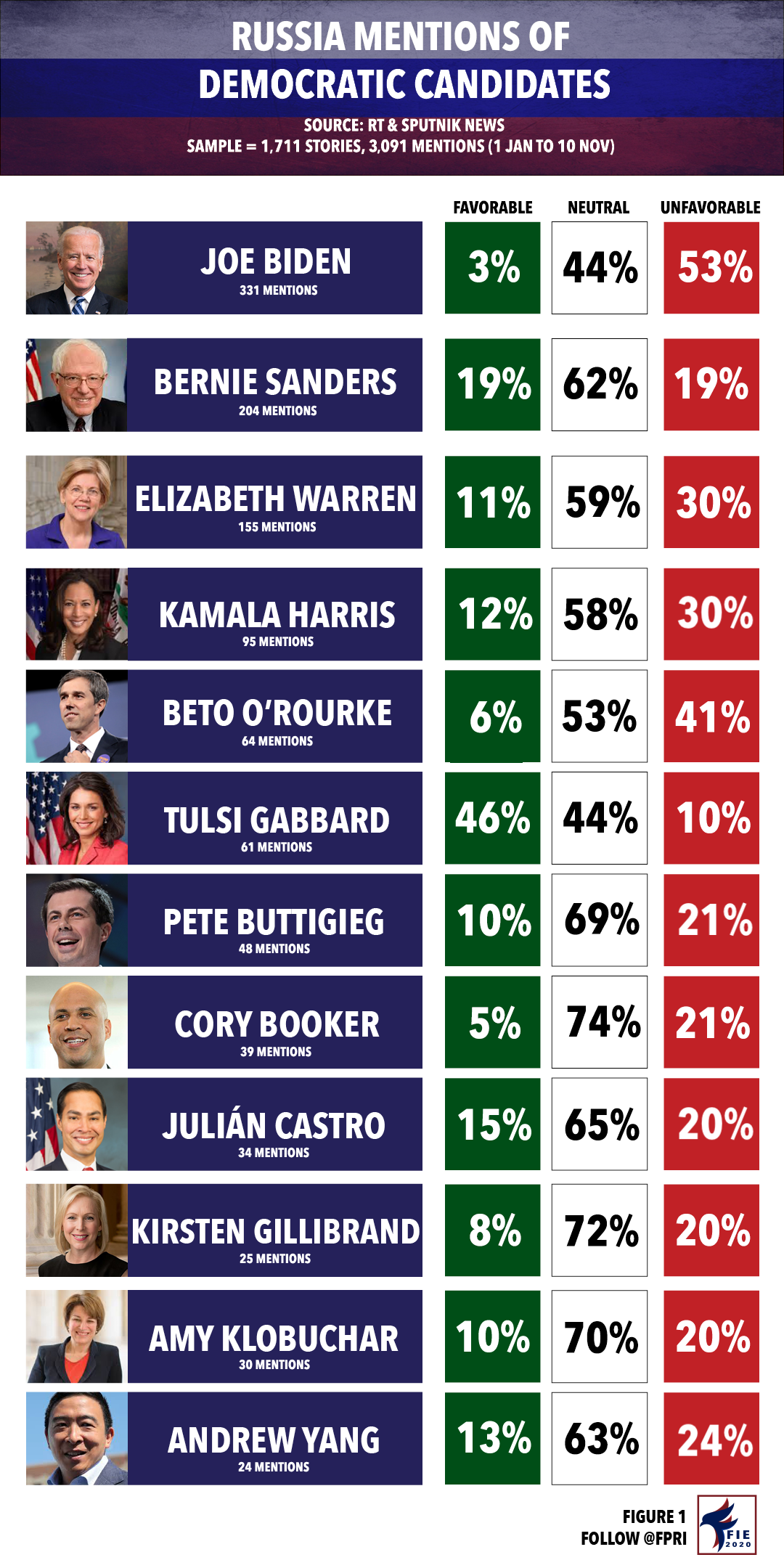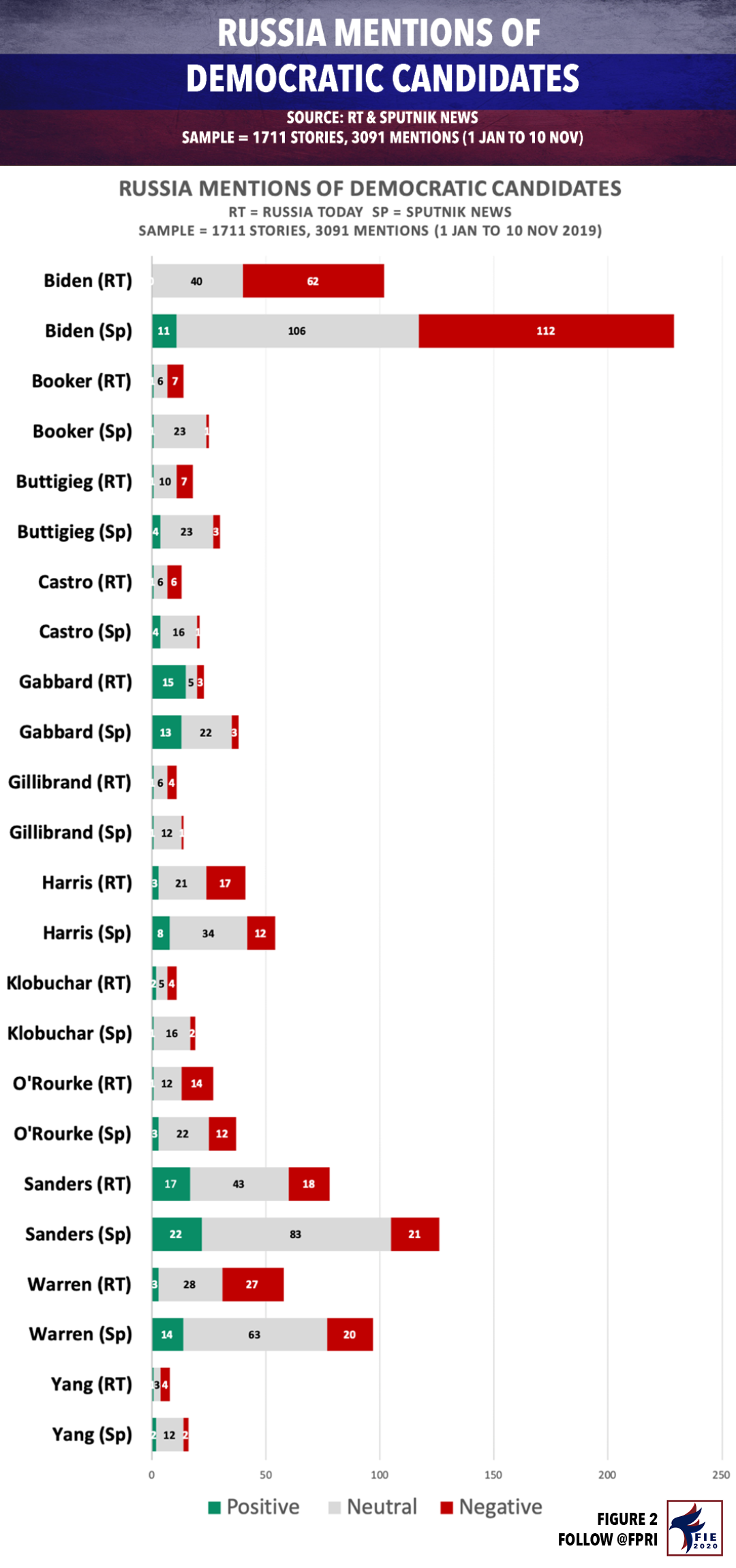A nation must think before it acts.
Russia’s Media Mentions of 2020 Democratic Candidates
November 19,
Post by Clint Watts
U.S. officials continually remind us that Russia’s interference in U.S. elections has not stopped and is expected to continue up to and through next year’s vote on November 3, 2020. But Russia’s attempts to interfere in the 2020 presidential election will be different from their 2016 playbook. Kremlin influence campaigns continually evolve and adapt as social media companies take down their accounts and the U.S. government implements defensive measures.
Current assessments of Russian disinformation focus heavily on social media accounts of unknown or uncertain attribution. At this point, there may be more people looking for Internet Research Agency accounts and bots than there are Internet Research Agency employees. I would assess that the political campaign and election-related swarms of computational propaganda present on social media in recent weeks originate more frequently from domestic sources rather than foreign ones.
To understand Russia’s upcoming influence and interference activities, I offer an alternative approach: read and listen to what Russia says publicly first before scouring piles of social media data in search of their trolls. Whether it’s 2016 or 2020, the Kremlin doesn’t hide its opinions on who it’d like in the White House. Analysis of overt foreign propaganda provides essential reconnaissance for searching out covert social media influence. Collation of Kremlin talking points about candidates also helps to distinguish international disinformation from domestic disinformation and misinformation.
To understand where, why, how and for whom Russia might interfere in the 2020 presidential election, the Foreign Policy Research Institute’s (FPRI) Foreign Influence Election 2020 (FIE 2020) Project has assembled a research team to read, analyze and report on what Kremlin state-sponsored news outlets say with regards to the 2020 U.S. election and the presidential candidates.
The FIE 2020 Project’s first batch of analysis examines the following question:
“What does Russian state media say about the Democratic candidates?”
The research team analyzed 1,711 Russia Today (RT) and Sputnik News articles from January 1 to November 10, 2019 that pertained to the 2020 presidential election (705 RT stories, 1,006 Sputnik News stories). Those 1,711 stories hosted 2,772 mentions of either the president, Republican candidates or Democratic candidates for president in 2020. More than half of those mentions referenced President Trump, which will be analyzed in a separate upcoming post. The team also logged an additional 319 mentions of former presidents and presidential candidates, which will be analyzed separately as well. Mentions were evaluated as “neutral,” “favorable” of the candidate or “unfavorable” of the candidate. (For more on the FIE 2020 methodology, see here.)
The 1,203 mentions of Democratic candidates quickly illustrated the Kremlin’s preferences amongst the Democratic field and, in particular, who they likely don’t want to see inaugurated in January 2021. Here are some highlights from this first round of analysis regarding the Democratic candidates along with two charts. Figure 1 represents the distribution of mentions and Figure 2 shows the count of mentions assessed on each media outlet:

- Russian outlets clearly do not like former Vice President Biden
- Of the 331 times Biden surfaced in RT and Sputnik News, 53% of the mentions were negative.
- Biden received the most mentions of any Democratic candidate and is the only candidate in the entire presidential field to receive more negative mentions than neutral mentions, or than neutral mentions and positive mentions combined.
- For Russia thus far, Biden is to 2020 what Hillary Clinton was to 2016.
- Senator Bernie Sanders received mixed coverage from Russian outlets
- Sanders received 204 mentions during the period evaluated, with an even split of positive and negative mentions.
- Having monitored the 2016 Russian influence campaign, I’d note that, anecdotally, it seems Russia is less favorable of Sanders this election cycle than during his last campaign. (I don’t have data for the last election, this is just my takeaway having previously watched Russian influence campaigns.)
- Senator Elizabeth Warren has recently moved into the Kremlin’s crosshairs
- Warren received 155 mentions (third-most) in our analysis. The upward trend in mentions coincides with her climb in the polls.
- Roughly one-third of Warren’s mentions were negative, and the preponderance of these mentions have come in recent weeks. Note that Russia’s negative trend on Warren will be the focus of an upcoming separate post regarding the substance of Kremlin-sponsored content.
- Russia is not a fan of Senator Kamala Harris
- Harris received the fourth-most mentions (95) and the third-most negative mentions.
- Harris surfaced with the second-most mentions in early 2019, but has tailed off precipitously in Russian mentions, having been replaced by Warren. Note: Temporal trends in Russian mentions will be further evaluated in a separate post.
- Former Congressman Beto O’Rourke received consistent negative coverage from Russia
- In 64 mentions of O’Rourke, 26 were negative; only four were positive. Many of these negative mentions related to the Congressman’s stance on specific issues, such as gun rights. Further discussion of issue-based mentions will come in future posts.
- Congresswoman Tulsi Gabbard is the overwhelming favorite of Kremlin news outlets
- Since January 1, 2019, Gabbard has been mentioned 61 times, ranking sixth in total mentions just behind O’Rourke.
- Gabbard is the only candidate assessed to receive more positive mentions (28) than negative mentions (6), and more positive mentions (28) than neutral mentions (27).
- Mayor Pete Buttigieg, despite a recent surge in the polls, hasn’t garnered much attention from the Kremlin
- Buttigieg surfaced in only 48 mentions thus far; like most other Democratic candidates in the field, his mentions were predominantly neutral (69%).
The charts included here represent data analyzed through November 10, 2019. These charts and the analysis will be updated periodically as new data arrives. Note: The average amount of election-related content produced by Kremlin-backed outlets is between 12 to 20 stories per day, depending on the American-related news cycle. Patterns of discussion related to candidates can change rapidly and narratives may shift drastically. We will update this chart regularly over the next year. In the following weeks, further insights into the temporal trends, themes and narratives regarding each candidate will be published. Additionally, similar analysis to this will be conducted for Iranian and Chinese state media over the next month.





